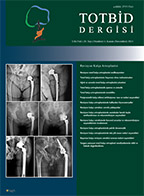
Instability is a frequent condition in total hip arthroplasty surgery. Patient and/or surgery related issues play role on the etiology of instability and dislocations. Patient related leading issues are age, gender, previous hip surgery, neuromuscular disorders, soft tissue laxity and spinopelvic alignment problems. And the leading surgery related issues are type of surgical approach, position and placement of arthroplasty materials, implant choice, soft tissue condition and experience of surgeon. During the diagnosis of instability patient`s complaints, physical examination findings, and radiological evaluations must be considered. The main cause of instability and dislocation must be find out and the treatment must aim to solve this cause related problem. Closed reduction is satisfactory for early dislocations. Surgical intervention is preferred for late instability and recurrent dislocations. The most effective topics to prevent instability of total hip arthroplasty are sufficient evaluation of the patient while preoperative planning, appropriate and accurate surgical technique, educating the patients for postoperative care.